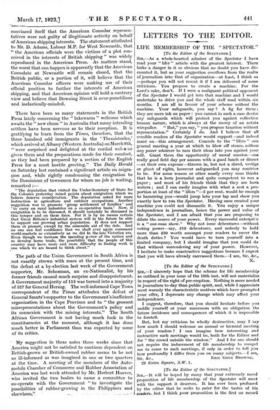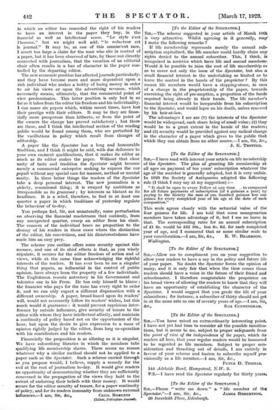[To the Editor of the SPECTATOR.] SIR, —It will be hoped
by many that your extremely novel proposition of life membership of the Spectator will meet with the support it deserves. It has ever been professed by the editor that he seeks to pater, for the tastes of. his readers—but I think your proposition is the first on record
in which an editor has conceded the right of his readers
to have an interest in the paper they buy, in the financial as well as intellectual sense. 'Le style c'est l'homme," but we might well add, " le redacteur est le journal." It may be, as one of this omniscient race, I assert too large a claim for the man who sits in control of a paper, but it has been observed of late, by those not directly connected with journalism, that the vacation of an editorial chair often results in a loss of character in the paper con- trolled by the departing editor.
The new economic position has affected journals particularly, and they have become •more and more dependent upon a rich individual who makes a hobby of losing money in order to air his views or upon the advertising revenue, which necessarily means, ultimately, that the commercial point of view predominates. This latter position is only bad in so far as it takes from the editor his freedom and his individuality. I can name six papers which, within recent times, have lost their prestige with their editors. It may be they are finan- cially more prosperous than hitherto, or from the point of the owners the change has proved satisfactory ; but there are those, and I think the intellectual section of the readiv public would be found among them, who are perturbed by the vacillations in policy which result from changes of editorship.
A paper like the Spectator has a long and honourable tradition, and I think it might be said, with due deference to your own eminent qualifications, that it makes its editor as much as its editor makes the paper. Without that close unity of taste and tradition the Spectator might become merely a commercial enterprise seeking to express the vox populi without any special care for manner, method or mental sanity. In these latter things the readers of the Spectator take a deep personal interest. The new journalism is a rickety, sensational thing; it is swayed by ambitions as irresponsible as its grammar ; by interests as blatant as its headlines. It is a relief, therefore, to find in at Jea.ct one quarter a paper in which traditions of yesterday regulate the behaviour of to-day.
You perhaps feel, Sir, not unnaturally, some perturbation
on observing the financial maelstroms that suddenly, from any unexpected quarter, sweep an editor from his chair The concern of the individual bears no proportion to the dismay of his readers in those cases where the distinction of the editor, his convictions, and his disinterestedness have made him an easy prey.
The scheme you outline offers some security against this menace, and one of its chief effects is that, as you wisely stipulate, it secures for the editor freedom of action and of views, while at the same time acknowledging the rightful interests of the readers. It has ever been to me a singular thing that papers, so influential in the control of public opinion, have always been the property of a few individuals. The Englishman resents autocracy in his Government and tolerates one in his Press. He has only himself to blame ; the financier who pays for the tune has every right to order it, and we can only expect a different dispensation with a different ownership. A paper, broad-based upon its readers' will, would not necessarily follow its readers' wishes, but this much would it guarantee : it would prevent capricious inter- ference by outside influences, give security of tenure to the editor with whom they have intellectual affinity, and maintain a continuity of policy based not on the opportunism of the hour, but upon the desire to give expression to a mass of opinion rightly judged by the editor, from long co-operation with his contributors and his readers.
Financially the proposition is as alluring as it is singular.
We have subscribing libraries in which the members take qualifying life membership shares. There seems no reason whatever why a similar method should not be applied to a paper such as the Spectator. Such a scheme carried through as you propose would, I believe, supply a remedy for the evil at the root of journalism to-day. It would give readers an opportunity of demonstrating whether they are sufficiently concerned in the propagation of the views they hold to the extent of endorsing their beliefs with their money. It would secure for the editor security of tenure, for a paper continuity of policy, and for its readers immunity from unknown external LEditar.Battingialm Joiarn.











































 Previous page
Previous page